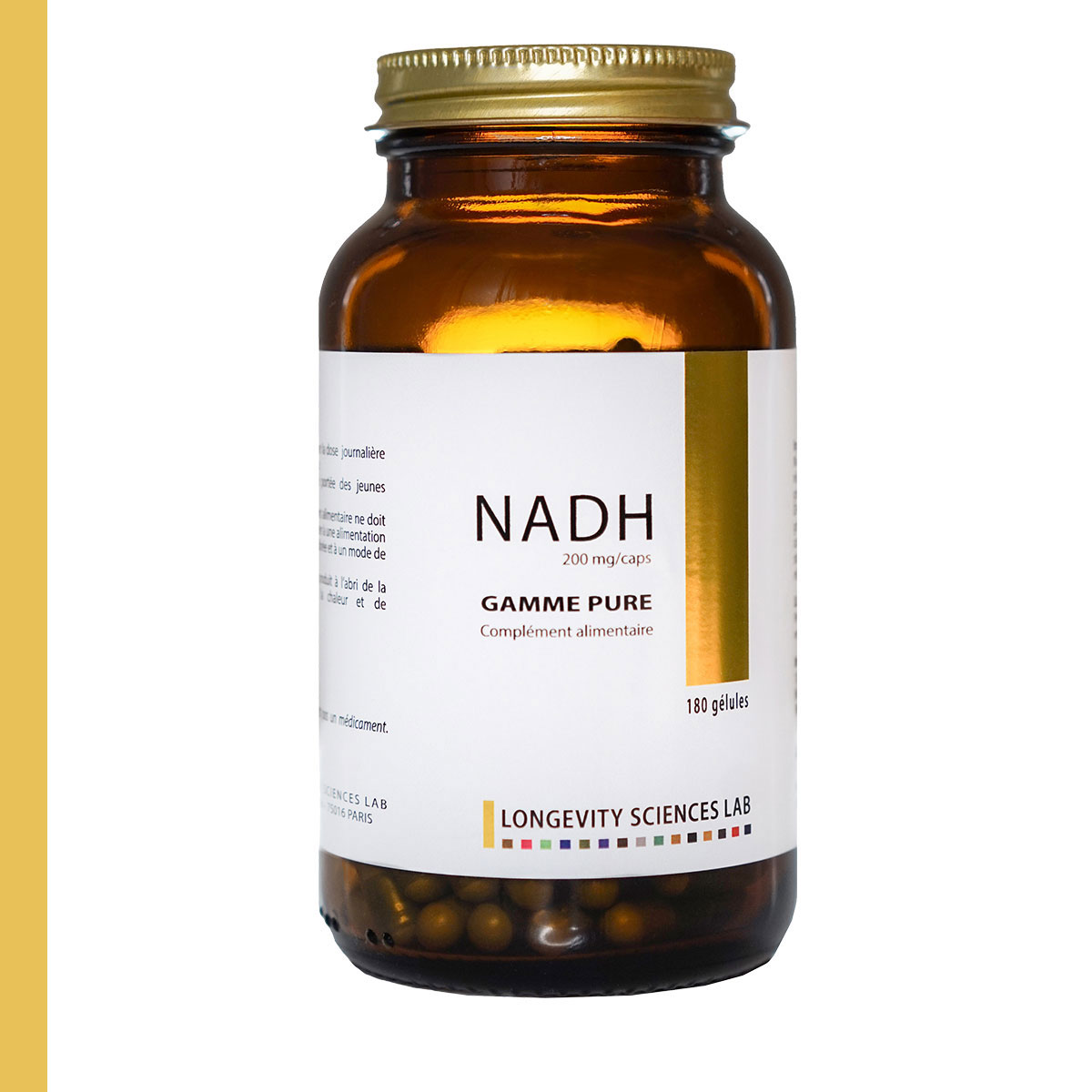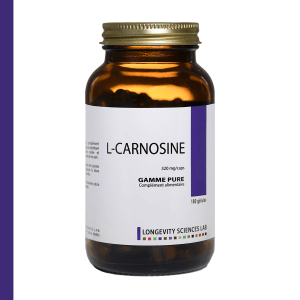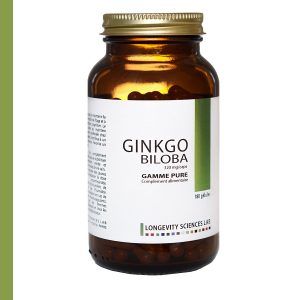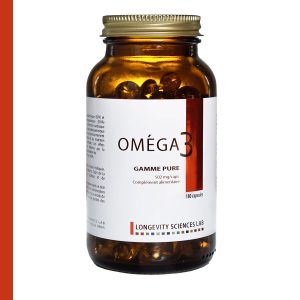Description
NADH, or nicotinamide adenine dinucleotide, is a natural molecule produced by the body that is involved in many important biological processes.
Here are the properties described in the scientific literature:
- Increased cellular energy levels
- Improved cardiovascular health
- Enhanced cognitive function and memory
- Strengthened immune system by enhancing immune response
- Reduction of inflammation and oxidative stress
- Improved athletic performance and reduction of sports fatigue
- Prevention and treatment of ocular conditions
- Improvement of female fertility
Why choose our product to support your health?
Our products are manufactured in the heart of France, in the Loire Valley.
Through our partner laboratories, all our products are certified organic.
Exclusively composed of natural ingredients, our product is guaranteed to be free of additives, GMOs, and vegan.
The formulation of our products has been studied with the utmost expertise to allow optimal action of our physiological correctors for your well-being.
By following the recommended dosage, our physiological corrector will cost you €163.33 per month.
Invest in your health with Longevity Sciences Lab.
Critical analysis of the scientific literature on NADH Metabolism of NADH and its roles in cellular processes during aging
NADH influences numerous key cellular functions, such as DNA repair, cellular senescence, and immune cell function. These processes and cellular functions are essential for maintaining tissue and metabolic homeostasis, which is the functional balance of the body. Senescence is accompanied by a progressive decline in NAD+ at the tissue and cellular levels, and this decline is associated with many age-related diseases, including cognitive decline, cancer, metabolic diseases, and sarcopenia, which is age-related muscle wasting. Many of these age-related diseases can be slowed down and even reversed by restoring NAD+ levels. Therefore, NAD+ metabolism has emerged as a therapeutic approach for age-related diseases and extending human health. (1)
Furthermore, low levels of NAD+ have been linked to health issues such as aging and chronic diseases, particularly diabetes, heart disease, Alzheimer’s disease, and vision loss. (2)
- NADH, support for brain function
NADH can help improve cognitive function and memory and reduce mental fatigue. It is also used to support brain health in people with neurological disorders such as Alzheimer’s disease and Parkinson’s disease.
A study reported the results of a follow-up on 885 Parkinson’s patients. Approximately half of the patients received NADH through intravenous infusion, while the other half received it orally in capsules. About 80% of the patients showed a beneficial clinical effect. 19.3% of the patients experienced a significant improvement in disability, and 58.8% showed a more moderate improvement. Younger patients and those with a shorter disease duration had better results than others. Furthermore, the orally applied NADH led to an overall improvement in disability similar to that of the parenteral form. (3)
- NADH preserves the cardiac system
NADH can help reduce inflammation and oxidative stress, which can contribute to improved cardiovascular health.
Heart failure is a widespread and untreatable form of cardiac decompensation. It is commonly associated with diastolic dysfunction, meaning that the heart fills with blood with significant variations compared to a healthy individual. Moreover, this dysfunction is associated with a deficiency of nicotinamide adenine dinucleotide (NAD+). A study from 2021 demonstrated that oral supplementation with NAD+ resulted in lower blood pressure and reduced risk of cardiac mortality. Thus, NADH contributes to improving cardiovascular health. (4)
- NADH, effective for immune enhancement and reducing chronic fatigue
NADH is a coenzyme that is essential for energy production in cells. It can help increase energy levels and improve mitochondrial function.
A study was conducted to assess the efficacy of NADH in patients with chronic fatigue syndrome (CFS). CFS is a potentially disabling condition with an unknown origin. Although its clinical presentation is associated with many symptoms, fatigue is a universal and essential finding for its diagnosis. The double-blind study showed that patients who received NADH had a dramatic and statistically significant reduction in the average symptom score during the first quarter. Furthermore, high levels of IgG and IgE antibodies were found in a significant number of patients. IgG and IgE are antibodies that actively defend the body against pathogenic strains, thus directly involved in immune defense. NADH has a beneficial effect against fatigue and also helps strengthen the immune system by increasing the production of certain immune cells and improving immune response. (5)
- NADH, an ally for visual health
NADH is a cofactor and essential organic compound for neuronal survival. Glaucoma is a common neurodegenerative disease in which neuronal levels of NAD+ decrease. This metabolic disturbance is prevented by nicotinamide. A study demonstrated that nicotinamide has neuroprotective effects against human glaucoma. (6) Another study implicates NAD+ in preserving visual health and retinal function, highlighting the importance of NAD+ metabolism in the normal, aging, and/or diseased retina. (7)
- NADH preserves the cardiac system
Heart failure with preserved ejection fraction (HFpEF) is a very common and untreatable form of cardiac decompensation. It is a cardiac insufficiency complication that can have serious consequences. This pathology is commonly associated with a diastolic disorder, which means that the heart fills itself with blood according to significantly different variations than a healthy patient. Moreover, this disorder is associated to a cardiac deficit in nicotinamide adenine dinucleotide (NAD+). A 2021 study demonstrated that when there is an increase of NAD+, received orally, there is lower blood pressure and a reduced risk of cardiac mortality. Therefore, NADH is a potential therapy to treat diastolic disorders in humans (8)
- AJ Covarrubias, R Perrone, E Grozio, E Verdin, metabolism and its roles in cellular processes during ageing, Nature Reviews. Molecular cell biology, December 2022
- S Johnson, SI Imai, NAD + biosynthesis, aging, and disease, F1000Research, February 2018
- J R. Tribble, A Otmani, S Sun Nicotinamide provides neuroprotection in glaucoma by protecting against mitochondrial and metabolic dysfunction, Redox Biololgy,43, July 2021
- RN Jajeda, MC Thounaojam, M Bartoli, PM Martin, Implications of NAD + Metabolism in the Aging Retina and Retinal Degeneration, Oxidative Medicine and Cellular Longevity, May 2020
- MJ Bertoldo, DR Listijono, WH Jonathan Ho, NAD + Repletion Rescues Female Fertility during Reproductive Agin, Cell reports, February 2020
- ML Santaella, I Font, OM Disdier, Comparison of oral nicotinamide adenine dinucleotide (NADH) versus conventional therapy for chronic fatigue syndrome, Puerto Rico Health Sciences Journal, June 2004
- JG Birkmayer, C Vrecko, D Volc, W Birkmayer, Nicotinamide adenine dinucleotide (NADH)–a new therapeutic approach to Parkinson’s disease. Comparison of oral and parenteral application, Acta Neurologica Scandinavica. Supplementum, 1993
- M Abdellatif, VT Harbst, F Koser, Nicotinamide for the treatment of heart failure with preserved ejection fraction, Science Translational medicine, February 2021






